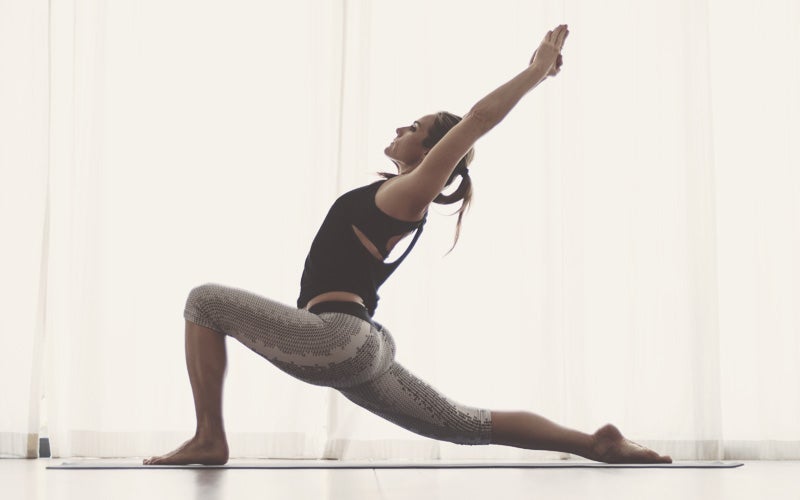How does exercise reduce stress? Plus our 4 reasons to get moving when you’re down
 © istock.com/Henk Badenhorst
© istock.com/Henk Badenhorst
After every stressful day, you’ve got a choice: throw yourself on the couch with a sigh or shake it off with a workout! How does exercise reduce stress? Read on to find out why sports is the best way to relieve stress!
The demands you put on yourself are constantly increasing: “Better, faster, stronger!” Think that all you need to do to get rid of this stress is sprawl across the couch, put your feet up, and relax? Wrong! Exercise is THE key to successful stress reduction.
What Is Stress?
Stress is a healthy “alarm” reaction in your body. A primal instinct planted firmly in your brain signals the presence of internal or external threats and tells your brain it must react quickly. Within a few seconds, various stress hormones – adrenaline, insulin, cortisol, and norepinephrine – are released.
Your heart rate goes up and your muscles tense, while you start to breathe more quickly. Your cardiovascular system is running at top speed. For a large part of human history, it was vital for our ancestors to react to dangerous situations and challenges with fight or flight. That means that when your body is under stress, it’s on high alert and ready to give its all.
Stress Factor: Neither Fight Nor Flight
Today it’s rare that we have to fight with our fists or run for our lives. On the contrary, it’s usually the case that we don’t ever release this tension – the concentrated energy and stress hormones – and instead we don’t move enough, if at all, keeping our bodies in a loop of stress.
These contradictory behaviors result in a classic problem for today’s humans: Tension and energy aren’t released adequately and the stress hormones produced aren’t reduced.
In a stressful everyday life, your physical activity and nutrition plans can sometimes fall by the wayside. Take advantage of our free Body Check to get back on track, with nutritional advice and product recommendations tailored to your fitness level and goals.
Stress Release: Couch or Exercise?
If you’re looking to chill out after a turbulent day at work by flopping onto the couch and letting your favorite series wash over you, your body will relax, but you won’t get the benefits of exercise and stress relief.
Your heart rate, blood pressure, and your breathing will all decrease, but your muscles will still be tense and the stress hormones that were released earlier will continue to circulate in your body.
Exercise, on the other hand, relieves stress by producing more hormones (endorphins and serotonin) to neutralize those stress hormones.
If your body continuously produces stress hormones and is unable to release its inner tension through movement, your body will go into a permanent state of alarm.
When your stress hormones aren’t neutralized by other hormones like endorphins, they’ll suppress the production of other hormones necessary for your health.
If your body continuously produces stress hormones and is unable to release its inner tension through movement, it will go into a permanent state of alarm. The consequences can play out as physical and mental health problems such as concentration difficulties, sleep disorders, or digestive problems.

4 Reasons Why Working Out Is Better For Stress Relief Than The Couch
Movement reduces built-up tension and energy, we all know that. Here are four more reasons why exercise is key to stress relief!
1. Running Makes You Happy
Studies show that moderate aerobic exercise with a duration of 30 to 60 minutes releases mood-boosting endorphins1 and serotonin. They give you that relaxed feeling after an intense workout and lift your spirits. Who doesn’t like a natural shot of happiness hormones?
2. Natural Energy Boost for More Creativity at Work
Regular exercise stimulates the flow of oxygen to your brain, strengthening your “mental fitness,” and refreshing your gray matter. So get off your office chair, get into your running shoes, and clear away the cobwebs in your brain to make way for new inspiration.
3. Exercise as a Distraction from Everyday Stress
No matter what was on your mind – work, conflicts with friends, or tension with co-workers – during your workout you’re only focusing on your body. Thinking about executing the exercise correctly makes for a great distraction.
4. Working Out Makes You More Resistant to Stress
Regular exercise regulates the stress levels in your body. Exercise activates your metabolism, which improves stress hormone regulation, making you more resistant to stress so you can cope with it in a more relaxed way.
Ready to get started? Our free foodspring workouts are effective fitness plans to do at home, tailored to your goals and your fitness level.
Exercise That’s Perfect for Fighting Stress
No matter whether it’s going for a run or clearing your head with a spin class – exercise is an effective and healthy way for your body to relieve stress. The best kind of physical activity to relieve stress varies from person to person, so you should figure out what works for you. The following types are a good place to start!
Inner strength through rest and relaxation: Yoga and qigong focus on a conscious deceleration. Deliberate muscle tension and exercises adapted to your breath relax your body and mind. When you concentrate on your body, your needs become more obvious.
Work out in a team: Sitting alone in an office all day can leave you lonely and in need of some relief from stress. If so, the multiple benefits of team workouts can help: physical activity, social contacts, and people to share your daily burdens with. Whether it’s a soccer team or jogging through the park in a group – exercising with other people motivates you and helps you fight your inner slacker.
Just dance the stress away: Dancing is a perfect type of physical exercise, combining something fun with something useful. Dancing is strenuous, burns calories, and – with the right music – it’s also a lot of fun. One step after the other, your thoughts are centered and you’re distracted from your worries. Aesthetic physical activity also has a soothing effect and improves your physical awareness.
What are you waiting for? Get going and work it out! How do you reduce stress? What helps you relax?
Exercise to Cope with Stress: Conclusion
- States of stress produce certain hormones.
- These stress hormones may have a negative influence on your health and your well-being.
- Using exercise to combat stress helps neutralize stress hormones with endorphins.
Sources for this article
We at foodspring use only high-quality sources, including peer-reviewed studies, to support the facts within our articles. Read our editorial policy to learn more about how we fact-check and keep our content accurate, reliable, and trustworthy.



























